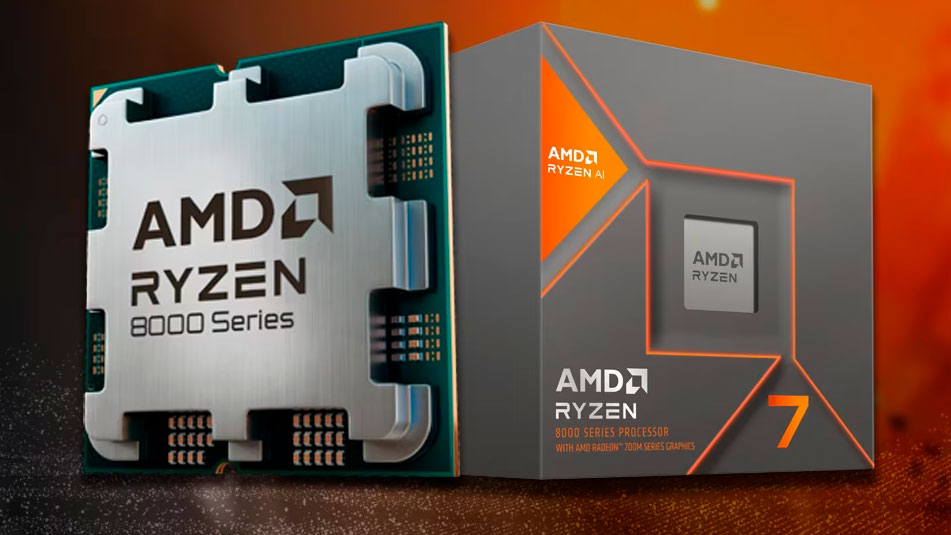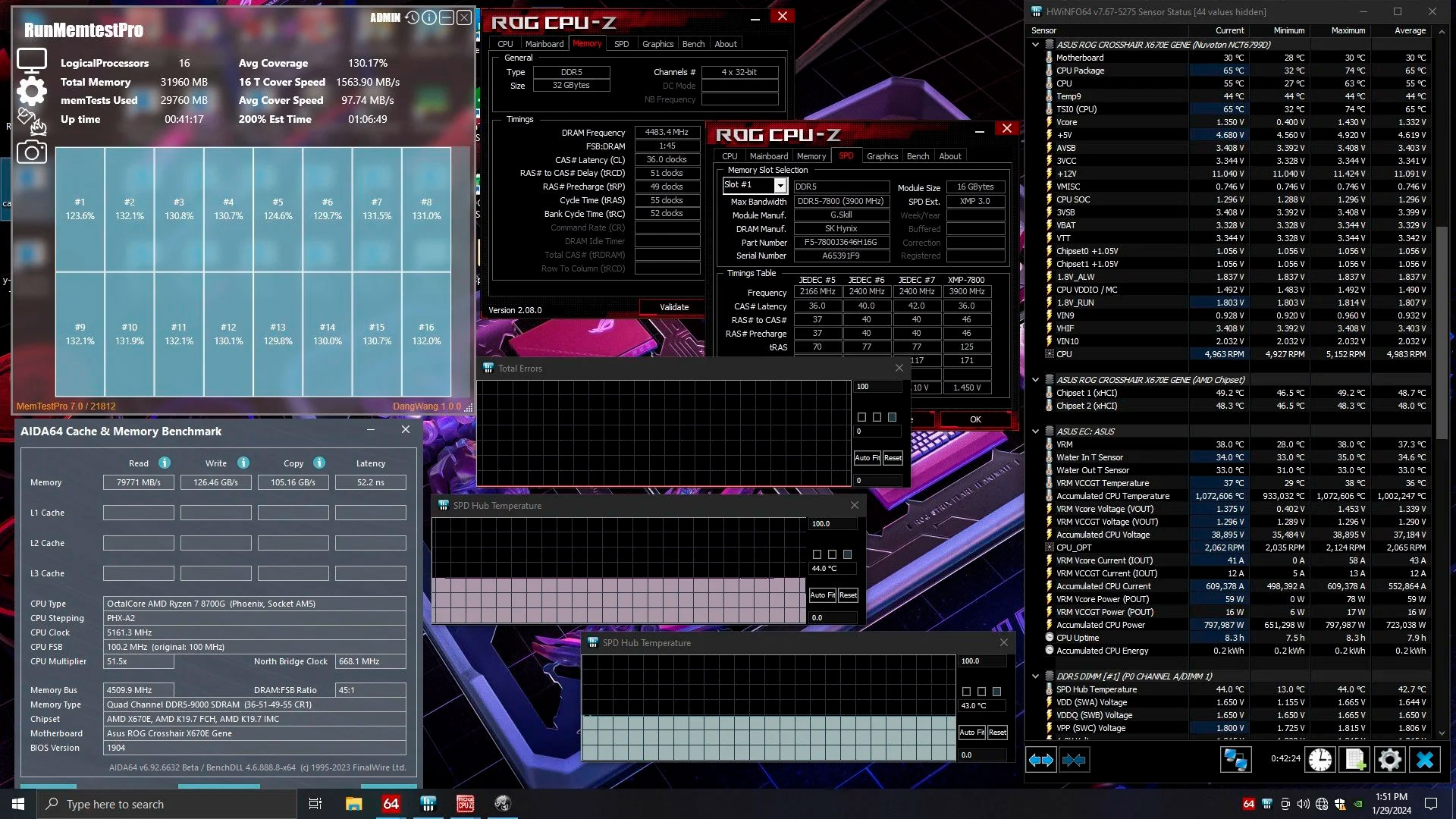AMD's integrated graphics performance shines in AI tests with extreme memory — Ryzen 7 8700G with DDR5-9000 up to 15% better

It didn't take long for AMD's Ryzen 8000G (Phoenix) processors to find their way onto the list of best CPUs. New tests from enthusiasts show that the new Zen 4 parts, such as the Ryzen 7 8700G, can harness fast memory.
South Korean overclocker safedisk (via HXL) has shared the results of his AMD 7 8700G pairing up with DDR5-9000 memory on the overclock.net forums. It looks like a good sample, as he maintained the FCLK at 2,500 MHz. Safedisk overclocked G.Skill's DDR5-7800 C36 2x16GB memory kit to DDR5-9000, a significant 15% increase. The memory timings (36-51-49-55) weren't so bad, but he had to push the DRAM voltage to 1.65V, which is ok for demonstration purposes but not a value we would recommend for daily usage.
It's exciting to see that the Ryzen 8000G has a capable integrated memory controller (IMC). The Ryzen 8000G series officially supports DDR5-5200, so safedisk's overclock represented a 73% uplift in terms of data rate. However, it's important to highlight that not every Ryzen 8000G sample runs with DDR5 at those high frequencies. Unfortunately, safedisk didn't run any real-world benchmarks on his configuration. However, the overclock did share a screenshot where the Ryzen 7 8700G was hitting 79 GB/s read, 126 GB/s write, and 105 GB/s copy performance with AIDA64's benchmark. Latency, at 52.2ns, wasn't shabby, either.
Ryzen 7 8700G AI Benchmarks
| Data Rate | Timings | Procyon AI Inference | GIMP with Stable Diffusion |
|---|---|---|---|
| DDR5-7600 | 38-48-48-116 | 242 | 80.52 |
| DDR5-7200 | 38-48-48-116 | 234 | 81.71 |
| DDR5-6000 | 38-38-38-78 | 225 | 82.38 |
| DDR5-4800 | 40-40-40-77 | 210 | 83.54 |
It's common knowledge that AMD's Ryzen APU's gaming performance scales very well with faster memory. Therefore, it's exciting to see how Ryzen 8000G's Radeon 780M iGPU behaves with fast memory AI, with AI being all the hype nowadays. Hardware enthusiast chi11eddog has evaluated the impact of high-speed memory on AI performance using the Procyon AI inference benchmark and GIMP with Stable Diffusion.
Procyon evaluates six different neural network models with its benchmark: MobileNet V3, Inception V4, YOLO V3, DeepLab V3, Real-ESRGAN, and ResNet 50. A higher overall score is better. Meanwhile, the GIMP benchmark involves installing the Stable Diffusion plug-in in GIMP to generate an image, so a lower time is better.
The results show a 15% increase in AI performance in Procyon, going from stock DDR5-4800 C40 to DDR5-7600 C38. Meanwhile, there was a 7% delta between DDR5-4800 C40 and DDR5-6000 C38. On the other hand, the performance delta in GIMP with Stable Diffusion wasn't as significant. DDR5-7600 C38 only reduced the generation time by 4% compared to DDR5-4800 C40.
AMD's Ryzen 8000G processors officially launched yesterday. The flagship Ryzen 7 8700G is available for $329. The Ryzen 5 8600G goes for $229, whereas the Ryzen 5 8500G will retail for $179 once in stock.
Get Tom's Hardware's best news and in-depth reviews, straight to your inbox.

Zhiye Liu is a news editor, memory reviewer, and SSD tester at Tom’s Hardware. Although he loves everything that’s hardware, he has a soft spot for CPUs, GPUs, and RAM.
-
Amdlova 15% better for combo CPU + RAM our you get a i3 and a 4070 super for 350% better performanceReply -
ThomasKinsley I'm going to make myself sound very old, but I remember the DDR spec generally doubled with every edition (DDR1, 2, 3, etc.). But since DDR4 we went from 2133MHz to 9000MHz. That's a significant change of pace and hopefully it will continue.Reply -
d0x360 I've been playing with ai video upscaling (7950x3d @ 5.4ghz ccd0 & 5.9 GHz ccd1), rtx 4090, 64 gigs 7000mt ddr5 @ CL28-28-30-70 oc'd from 6000mt) and with a combination of memory, cpu and GPU overclocking I've got the upscale time down from 16 hours to 9... on a 4 min 1080p to 4k video using a Vulkan based scaler lol.Reply
Sigh.. someday deep space 9 some day! I wonder if a ai accelerated CPU if I'd get gains assuming the tool supported it. I had my 4090 pegged at +350 core+1400 mem and it was chugging all the vram with a tile size of 400 so I had to lower it to 375 which left me 2.4 gigs of wiggle room so no crashing but it increased my final output time from 6.9 per frame to 9.1s. booooo hissssss! I'm g testing out fastencode on ffmpeg tonight on a 6 sec clip to see how the quality is because that's another reduction of like 30%. Also need to enable my igpu for mgpu and see if that lil boi can help any lol. Only an hour to go! -
TerryLaze ReplyAdmin said:Enthusiasts have demonstrated the prowess of AMD's Ryzen 7 8700G with DDR5-9000 memory and how fast memory affects AI performance.
AMD's integrated graphics performance shines in AI tests with extreme memory — Ryzen 7 8700G with DDR5-9000 up to 15% better : Read moreThe memory timings (36-51-49-55) weren't so bad, but he had to push the DRAM voltage to 1.65V, which is ok for demonstration purposes but not a value we would recommend for daily usage.
So did AMD fix the mem controller issue? Do they use a new one? Did anybody report on that?! Are bioses still being restricted to 1.35V on these and is it safer now to overclock the ram? -
strobolt ReplyIt didn't take long for AMD's Ryzen 8000G (Phoenix) processors to find their way onto the list of best CPUs.
It's just that that they didn't. There's no single 8000G CPU on the list of best CPUs because the value proposition is not there. -
Eximo Reply
Well, if you are going to use 2133 for DDR4, then you have to use 4800 for DDR5.ThomasKinsley said:I'm going to make myself sound very old, but I remember the DDR spec generally doubled with every edition (DDR1, 2, 3, etc.). But since DDR4 we went from 2133MHz to 9000MHz. That's a significant change of pace and hopefully it will continue.
Or you could do a comparison of mainstream speed of 3200/3600 vs 5600/6000/6400. Of course DDR5 hasn't run its course and we can expect 7200 or something becoming a norm for desktop ram (already seeing such speeds in embedded systems) -
jp7189 Reply
Clocks are going up, but absolute latency has been worse so far this gen. Notwithstanding this OC attempt as 9000/36 is pretty good for CAS latency. The secondary timings aren't nearly as good though.ThomasKinsley said:I'm going to make myself sound very old, but I remember the DDR spec generally doubled with every edition (DDR1, 2, 3, etc.). But since DDR4 we went from 2133MHz to 9000MHz. That's a significant change of pace and hopefully it will continue.
Generally speaking, absolute latency has stayed pretty flat to slightly improved over the years; DDR5 bucked that trend, but there's still hope it'll get back on track by the end of the gen. -
jp7189 Excuse me, but did yReply
Excuse me, but did you say 9 hours for a 4 minute clip?! ..while using all 24GB on a 4090!? Yikes! I'm curious what tools you're using and what you're doing exactly. I don't do a lot of upscaling, but have been tinkering with AI transforms on video frames. Speed varies a lot, but normally I see frames per second, not seconds per frame.d0x360 said:I've been playing with ai video upscaling (7950x3d @ 5.4ghz ccd0 & 5.9 GHz ccd1), rtx 4090, 64 gigs 7000mt ddr5 @ CL28-28-30-70 oc'd from 6000mt) and with a combination of memory, cpu and GPU overclocking I've got the upscale time down from 16 hours to 9... on a 4 min 1080p to 4k video using a Vulkan based scaler lol.
Sigh.. someday deep space 9 some day! I wonder if a ai accelerated CPU if I'd get gains assuming the tool supported it. I had my 4090 pegged at +350 core+1400 mem and it was chugging all the vram with a tile size of 400 so I had to lower it to 375 which left me 2.4 gigs of wiggle room so no crashing but it increased my final output time from 6.9 per frame to 9.1s. booooo hissssss! I'm g testing out fastencode on ffmpeg tonight on a 6 sec clip to see how the quality is because that's another reduction of like 30%. Also need to enable my igpu for mgpu and see if that lil boi can help any lol. Only an hour to go! -
ThomasKinsley Reply
I see your point. 2133Mhz was the original "mainstream" for DDR4 back in 2015 or 16 with mobos and chips restricted to that speed (certainly obsolete now). But even comparing the current mainstream of 3600Mhz, we're seeing DDR5 speeds in excess of 7200Mhz. It appears that DDR5 has a lot more headroom left in it before we move on to DDR6.Eximo said:Well, if you are going to use 2133 for DDR4, then you have to use 4800 for DDR5.
Or you could do a comparison of mainstream speed of 3200/3600 vs 5600/6000/6400. Of course DDR5 hasn't run its course and we can expect 7200 or something becoming a norm for desktop ram (already seeing such speeds in embedded systems) -
Eximo Reply
Yes, though DDR4 4800 and even 5133 were sold. 4400 is where most enthusiasts hovered around.ThomasKinsley said:I see your point. 2133Mhz was the original "mainstream" for DDR4 back in 2015 or 16 with mobos and chips restricted to that speed (certainly obsolete now). But even comparing the current mainstream of 3600Mhz, we're seeing DDR5 speeds in excess of 7200Mhz. It appears that DDR5 has a lot more headroom left in it before we move on to DDR6.
DDR5 already has official specs for 8000, which I believe was their target at launch.
There is a problem though with going much faster with DIMM modules, and why DDR5 has built in ECC. Which is why we see the fastest speeds on embedded solutions and very much tweaked solutions like in this article.
Faster speeds may not be achievable with the distance between the memory slots and CPUs. I expect onboard DDR6 or HBM to start makings its way into CPU packages and for socketed memory to become another memory layer.
